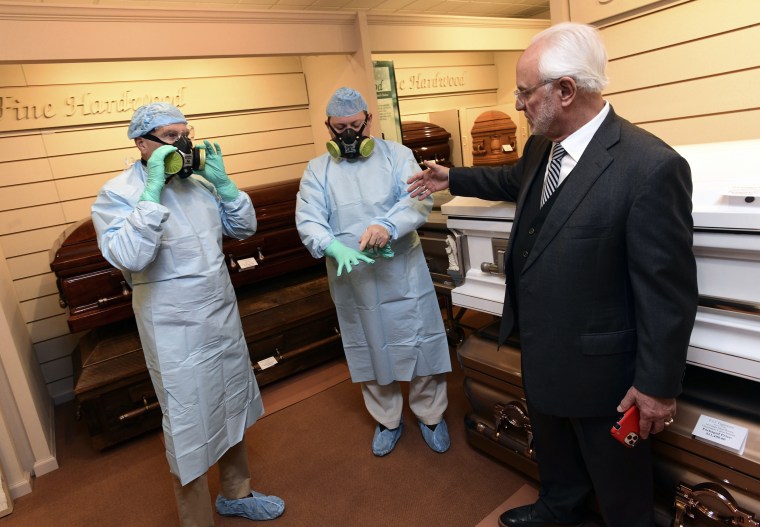The National Funeral Directors Association has asked President Donald Trump and Congress to designate death care workers as “essential critical infrastructure workers” as the coronavirus claims the lives of more and more Americans.
“Deathcare plays a vital, if often overlooked, part of the public health of our nation,” Christine Pepper, the group’s CEO, wrote in a letter dated March 20. “During a pandemic, such as COVID-19, or any mass-fatality disaster, deathcare represents a critical part of the public/private partnership that will help our nation heal and recover.”
So the group is seeking access to more personal protective equipment, exemptions from quarantine rules, and to be placed on a priority list for testing “and a vaccine when it becomes available.”
Pepper, whose organization represents more than 200,000 funeral home workers, said they face a “high risk of exposure.” She said there is precedent for this: In 2009, when faced with the H1N1 pandemic, the Centers for Disease Control and Prevention deemed “mortuary service providers” as critical workers.
Full coverage of the coronavirus outbreak
“On behalf of our members and the more than 200,000 deathcare professionals in the United States, we are grateful for your leadership and stand ready, as always, to care for the dead and the families left behind. You and the entire nation are in our prayers,” Pepper concluded in her letter to Trump.
Jessica Koth, a spokesperson for the organization, told NBC News Tuesday that they had not yet received a response from the president or Congress but said the group is also working with state-based associations to urge governors to act. "Those efforts are proving fruitful, with many states designating funeral professionals among critical infrastructure workers," she said.
The association also released CDC approved guidelines for its members aimed at protecting mortuary workers from catching the virus and for handling funerals during a pandemic.
Among other things, it offers instructions on the best way to disinfect body bags and what precautions need to be taken “if splashing of fluids is expected.”
The association also is offering its members a template for communicating with the public during this crisis. It states that “there is no known risk associated with being in the same room at a funeral or visitation service with the body of someone who died of confirmed or suspected COVID-19.”
At the same time, the number of people being allowed to attend funerals is being limited in some communities.
In New York, where Gov. Andrew Cuomo warned the death toll was rising, only immediate family members are allowed to attend wakes and funerals. And even they have to keep 6 feet away from each other.
“We were not allowed to hug or kiss,” Maria Crupi told NY1 on Monday after she buried her dad, World War II veteran Theodore Crupi of Staten Island. “I mean how could you go to your dad's funeral or wake or remembrance and you can't hug or kiss a family member you haven't seen or a lifelong friend. It was really devastating for us, very devastating."
Download the NBC News app for full coverage and alerts about the coronavirus outbreak
In Chicago, priests officiating at Catholic funerals have been told to limit the number of mourners to 10.
There were over 100 at the March 15 wake of 92-year-old Kazimierz Baranek, a beloved member of Chicago’s Polish American community. But just 60 at the funeral.
“We had fewer people attend,” his daughter-in-law, Mary Baranek told NBC News. “Many called or emailed sympathies but stated that concern over our health prevented them from coming in person.”
Mary Baranek said they had hand sanitizer at the entrance to the funeral parlor and by the guest book.
“I was using medical grade wipes on the kneeler,” she said. “People were still hugging. Some kissed on the cheek when they forgot.”
Meanwhile, the Episcopal Diocese of Milwaukee has canceled all funerals “until the time of social distancing can be ended.”
In Maryland’s Montgomery County, as many as 100 people sitting shiva (a seven day period of mourning observed by Jews) at a retirement home, starting Feb. 28, were potentially exposed after three attendees who contracted the coronavirus on a cruise in Egypt later tested positive.

